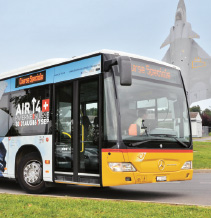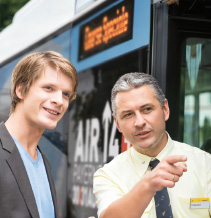Transport partnership
With PostBus to the planes
AIR14 in Payerne was the largest air show in Europe, attracting more than 400,000 people over ten days. Apart from the numerous aircraft, there were also 60 Postbuses on hand, transporting up to 46,000 people a day at the weekend.
With the number of spectators expected, the logistics on the ground were as challenging as the choreography in the air: the transport plan involved three train stations and two huge car parks, with the Payerne military airfield in the middle of it all. PostBus was responsible for transportation between the different locations.
Transport without waiting times
Of the 60 vehicles and 110 drivers on hand, some came from the Western Switzerland region, with the rest from other regions including Basel, Berne and Valais. As such, planning was important, as Project Manager Célia Cressier acknowledges: “Coordination with the other transport partners and the mobilization at PostBus took about twelve months.”
At the event itself, everything then went according to plan: some drivers and vehicles had to leave their depots as early as three o'clock in the morning. The meticulous preparation paid off, says Cressier: “Even on the heavily attended second weekend, hardly anyone had to wait at the stops.”
Accident-free service
Whether it's an air show, the Swiss wrestling and alpine festival or an open-air concert: PostBus is always there as a transport partner for major events. The yellow buses are in a class of their own and appreciated for their dependability, as again demonstrated by the staff involved in the AIR14 operation, whose performance was as rigorous and accident-free as their colleagues in the air.


1 _
Over ten days, 110 drivers and 60 vehicles were on the road for the AIR14 air show.
2 _
PostBus employees, at their posts in Payerne long before the arrival of the special trains, welcome the first passengers.